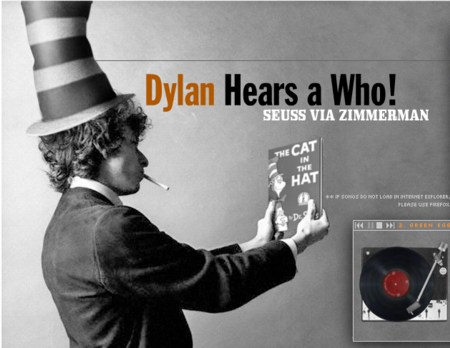
Salon has half a story about Kevin Ryan, the one-man-band behind the incredible Bob Dylan - Dr. Seuss mashup, "Dylan Hears A Who," and his wrangling with Dr. Seuss Enterprises over the parody exception in copyright law.
Oh wait, Ryan isn't wrangling, and he isn't commenting. He ceased and desisted on cue. [And while I guess he's best known in vinyl geek circles as the co-author of "Recording the Beatles," I still think Ryan's biggest claim to fame until now was his band's creation of the "Yao Ming" arena song that punctuates Mavericks games.]
DSE is billed as one of the most jacked-in players in the IP industry, but the article doesn't really go into that. Mostly, it's a hypothetical chat with a copyright law prof about whether Ryan's work would qualify as parody, should he ever defend himself. The verdict: He uses too much Seuss text for his lyrics, so probably not.
Whatever. Why is there no mention of another possible carveout, the compulsory license? I would have liked to hear an IP lawyer's opinion on Ryan's chances of distributing his performances, not as parodies, but as cover versions. Could the law that lets a million glockenspiel lullaby versions of Radiohead bloom have protected Ryan's Seussical? Could he have been too legit to quit from the start by simply paying the pre-set royalties for any copies sold online [which, if he didn't sell them, could have equalled zero?]
It's all moot for "Dylan Hears A Who," of course. Obtaining a compulsory license involves a very specific set of filings be made before you distribute anything. Ryan can't retroactively claim cover version status for his songs.
The real hypothetical, it seems, is whether book text set to music is treated differently than a published song, which is subject to compulsory license? Does the source of the lyrics matter? Could you set film dialogue to music under compulsory license? Because I've got at least one album of Tony Montana covers in me, if not more.
If the source/nature does matter, wouldn't turning written or spoken word into music constitute a transformative new work entitled to more 2 Live Crew-like protection? Any IP lawyers out there care to speculate? The fate of my yet-to-be-recorded speedmetal rendition of Goodnight Moon may hang in the balance.
Tangled Up In Seuss [salon]
How To Legally Sell Covers Of Copyrighted Songs [cdbaby]
Previously: Dr. Bob! Dr. Bob! Dylanesque Covers Of Seuss Songs [dt]

I'll speculate.
Section 115 of the copyright act (which is the source for the compulsory license) allows for a compulsory license for musical works -- not for literary works. They allow it only "when phonorecords of a nondramatic musical work have been distributed to the public."
If there had already been a licensed recording of the works set to music, a compulsory license would work. Without that, this would likely be looked upon as a "derivative work", which would not be permitted without a license from DSE (barring an exception to the exclusive rights set forth in section 106, like the fair use exception).
I wonder if the Red Hot Chili Peppers got permission to use "Yertle the Turtle" in their song of the same name (on the Freaky Styley album)?
[probably. Both DSE and RHCP were clients of ICM at the time, so I don't imagine it was too hard. Thanks for the clarification, btw. -ed.]